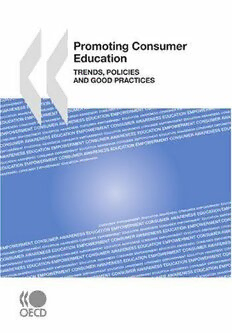
Promoting Consumer Education: Trends, Policies and Good Practices PDF
194 Pages·2009·1.227 MB·English
Most books are stored in the elastic cloud where traffic is expensive. For this reason, we have a limit on daily download.
Preview Promoting Consumer Education: Trends, Policies and Good Practices
Description:
Consumers today are challenged by growing amounts of information and wider choices of products, requiring them to develop skills and knowledge for making good choices in complex markets. This publication examines the approaches that governments use to promote consumer education in OECD and some non-OECD countries, highlighting the policies and measures that have been particularly effective. It also analyses recent trends, the role of stakeholders, steps being taken to evaluate the effectiveness of current programmes and the principal challenges. Table of Content : Chapter 1. Overview -Background -Definition and Goals of Consumer Education -Structure of Consumer Education -Institutions -Co-operative Schemes -Evaluation of Consumer Education Programmes -Key Issues and Challenges -Annex 1.A1. Evolution of the Concept of Consumer Education -Annex 1.A2. Institutional Framework for Consumer Education -Annex 1.A3. Major Initiatives in Consumer Education -Annex 1.A4. Summary of Key Challenges in Consumer Education -Annex 1.A5. Questionnaire on Consumer Education: Consumer Rights Chapter 2. Analysis of Selected Countries -Australia -Ireland -Japan -Korea -Mexico -Norway -Portugal -Slovak Republic -Spain -Thailand -Turkey -United Kingdom -United States -United Nations Environment Programme -Annex 2.A1. Consumer Education Strategy Analysis Template Chapter 3. Summary and Conclusions -General Approach to Consumer Education -Formulating Goals for Consumer Education -Key Approaches to Consumer Education -Communication -Co-operation and Co-ordination among Stakeholders -Evaluation -Challenges
See more
The list of books you might like
Most books are stored in the elastic cloud where traffic is expensive. For this reason, we have a limit on daily download.
